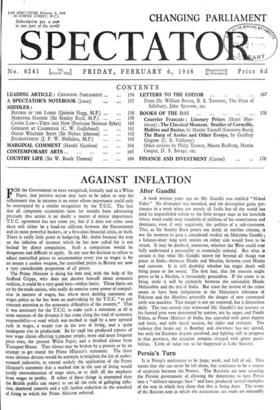After Gandhi
A book written years ago on Mr. Gandhi was entitled "Naked Fakir." No disrespect was intended, and the description gains per- tinence in a week when not merely all India but all the world has paid its unparalleled tribute to the little meagre man in his loincloth whose word could sway hundreds of millions of his countrymen and dominate, even if only negatively, the politics of a sub-continent. This, as Sir Stanley Reed points out justly in another column, is not the moment to pass a considered verdict on Mahatma Gandhi ; a balance-sheet long with entries on either side would have to be struck. It may be doubted, moreover, whether the West could ever fully understand a personality so essentially oriental. But what is certain is that what Mr. Gandhi strove for beyond all things was peace in India—between Hindu and Muslim, between caste Hindu and outcaste. It is still doubtful whether his tragic death will bring peace or the sword. The first fear, that the assassin might prove to be a Muslim, is fortunately groundless. If the crime is to bring strife it will be primarily between the nationalist Hindu Mahasabha and the rest of India. But since the motive of the crime seems to have been indignation at the Mahatma's tolerance of Pakistan and the Muslims generally the danger of new communal strife was manifest. That danger is not yet removed, but it diminishes daily. The vast crowds that witnessed Mr. Gandhi's last journey to his funeral pyre were dominated by sorrow, not by anger, and Pandit Nehru, as Prime Minister of India, has appealed with great dignity and force, and with much success, for order and restraint. The violence that broke out in Bombay and elsewhere has not spread, but with the Kashmir dispute unsolved, and fighting still in progress in that province, the situation remains charged with grave possi- bilities. Little of value has so far happened at Lake Success.






























